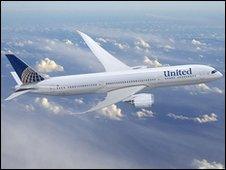United and Continental Airlines to merge
-
Published

US-based United Airlines and Continental Airlines have agreed a deal to merge, creating the world's biggest carrier.
The loss-making companies said they expected the deal, worth $3.2bn (£2.1bn), to deliver savings of more than $1bn a year.
The combined group will be named United Airlines.
But new branding will combine the current Continental colours with the United Airlines name.
After the deal was announced shares of both firms rose in morning trading in New York.
United's parent UAL Corporation saw its shares rise by 51 cents, or 2.37%, to close in New York at $22.11, while Continental shares were up 51 cents, or 2.28%, to $22.86.
Although United is seen as the dominant partner, the merger was described as "a merger of equals".
Together United and Continental currently fly to 370 destinations worldwide, flying 144 million passengers a year.
Combining the two companies will create the world's biggest airline, based on the total number of passenger-miles flown.
Continental's boss Jeff Smisek will be chief executive of the new company based in Chicago, while United Airlines' Glenn Tilton will serve as the non-executive chairman.
Mr Tilton called the deal "great... for our customers, our employees, our shareholders and our communities".
Cuts expected
"We are creating a stronger, more efficient airline, both operationally and financially, better positioned to succeed in a dynamic and highly competitive global aviation industry," he said.
The companies did not give any details on potential job cuts, but said they expected front-line employees to be "minimally affected by the merger", with staff reductions coming from retirements and voluntary redundancy.
The two companies currently employ a total of 86,000 people.
Analysts expect redundancies to form part of the merger, with airlines anxious to cut costs following a recent collapse in profits within the industry.
Chief executive Jeff Sismek said some cost-savings would come from getting the most out of aircraft and sharing IT services.
They also hope that the better choice of routes will be attractive to sought-after business customers.
'Oversupply'
Both companies are full-service airlines and have faced intense competition from low-cost operators.
United Airlines' parent company UAL reported a loss of $82m for the first three months of the year, after reporting a $1.1bn loss for 2009.
Continental reported net losses of $282m last year.
"This airline deal is expected to bring much-needed consolidation to the US airline industry as it suffers chronic oversupply," commented Saj Ahmad, airline analyst at FBE Aerospace.
"This announcement puts other players like American Airlines and US Airways on watch for who makes the next move."
Last month British Airways and Iberia followed the consolidation trend, merging to create one of Europe's largest carriers.
The United-Continental merger still has be approved by shareholders and competition regulators and will need the agreement of unions.
They hope to complete the deal by the end of the year.
-
-
Published23 April 2010
-
-
-
Published8 April 2010
-
-
-
Published11 March 2010
-